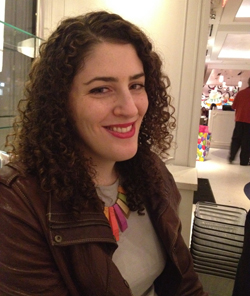 Please give a brief background on yourself and your career.
Please give a brief background on yourself and your career.
I graduated from Wellesley with a dual degree in International Relations-History and Italian Studies, and today I work at XO Group, a media company with websites The Knot (weddings), The Bump (babies) and The Nest (newlyweds). I am a Business Intelligence Analyst, so I work with all the brands to access and analyze data needed for business intelligence (BI) work. I spend a lot of time with databases and visualization software. My team likes to explain BI as tracking for any user activity on the site that creates revenue, such as a person looking at a banner, or signing up for a newsletter. It’s an interesting field to be in because it’s constantly growing and changing so everyone has a slightly different understanding of what it is. People keep talking about “Big Data” but no one knows entirely what it’s going to mean for the future.
How has your career changed since you originally envisioned it at Wellesley? What other careers did you consider as a student?
I am unique at XO because I’m probably the only person in the Technology department with a liberal arts background. My career path has taken a few twists and turns before ultimately ending here. Until my senior year I was planning on going to graduate school, but I didn’t have a good idea of what I actually wanted to do with an advanced degree, so I decided to look for a job instead. Immediately after college I started working for a historical consulting company where I got to use my history skills. I worked on exhibit development for history museums and did research on historical use of industrial sites for litigation. At first it was really exciting to be able to do historical research without an advanced degree, which is a unique opportunity. But eventually I found that it wasn’t interesting to me anymore and I missed my family, so I moved closer to them and started looking for other jobs. I ultimately took a job at a non-profit as an operations and development coordinator. My reasoning was that I didn’t know what I wanted to do, so while I figured it out I could at least be working at an organization that had a mission I liked.
How has Wellesley contributed to your career?
The best thing about working at a small non-profit is that there’s always limited resources, so you can expand your duties to include anything you’re interested in, as long as you can prove that it’s useful to the organization. When I was at the non-profit I was responsible for maintaining the donor database. I found that I loved the work and they encouraged me to continue training. I became an expert at the donor management software and then kept going, teaching myself relational database theory and SQL, which is a language used for querying some databases. When I started looking for my next job I knew I wanted to focus on the data work. The studying I had done on my own, plus my undergraduate experience made me a strong candidate. I think my Wellesley education really made a difference getting me the position at XO. With my liberal arts background I have the skills to explain technical concepts to non-technical business stakeholders.
What is a typical work day or work week like for you?
On a typical day as a BI Analyst I might be troubleshooting a report that is generating unexpected results because the business logic is failing somewhere, or building an interactive data visualization to explain how a website feature is performing, or coordinating with another team to make sure their new product has the tracking necessary for us to report on it. I was hired with the understanding that I had a technical and business background but also that I had the ability to learn new tools. I’m constantly training and improving my technical abilities, even outside of work.
What piece of advice would you offer students looking to get into your area of interest and expertise?
I think this is a very important aspect of technical work: there’s always a new tool or language available. For students who are interested in business intelligence and data analysis work they should make sure they know the basics, but also expect that they’re going to have to continue to learn after graduating. Meetups and online training sites are great opportunities, and many of them are free.
If you could come back and take one class at Wellesley what would it be?
I think that there’s a desire for education to be “pre-professional,” in the sense that your degree will immediately lead you to a specific job, but I wish I had known as a student that this wouldn’t always be the case. A Wellesley degree holds a lot of cachet and shows that I’m smart and able to learn something new. I loved what I studied at Wellesley and I’m glad that I did, but I don’t feel badly that I don’t reference my history knowledge every day. I wish I could take some of the computer science courses that Wellesley is currently offering, but I am proud of my self-taught skills.